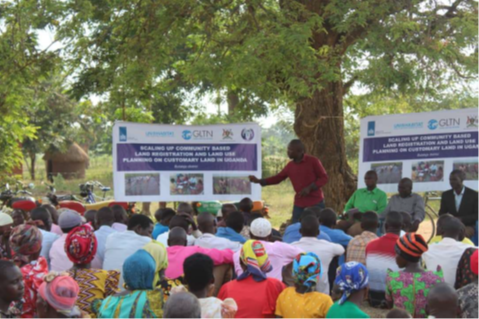As part of a scoping study titled Land Governance for Climate Resilience: A review and case studies from LAND-at-scale projects headed by Richard Sliuzas, Emeritus Professor, University of Twente, GLTN dove into the links between climate and land governance in the ‘’Scaling up community-based land registration and land use planning on customary land in Uganda’’ project. This case study highlights experiences from the community-based wetland management planning approach in Butaleja, Uganda, focusing on how the approach is addressing land governance issues and contributing to community climate resilience.
Context
Butaleja District is located in the Lake Kyoga basin in the eastern and north-eastern lowlands of Uganda, which is the second drainage largest basin in the country. The Butaleja District is 40% covered by wetlands, which have traditionally been used for agriculture, where about 73.9% of Butaleja’s farmers rely on them for irrigation and fertile soil. However, with an increasing population, coupled with land shortage and climatic variations, wetlands in the Butaleja have been facing degradation. Climatic changes includes heavy rains during the wet season causing effects such as flooding, erosion, damage to agricultural production and infrastructure, and even loss of life in low lying areas, or prolonged dry seasons causing water scarcity, damage to aquatic life and vegetation, and overall deterioration of wetland health. Additionally, human activities in particular rice farming practices, are leading to long-term environmental impacts. Also, there is illegal use of wetlands as per the National Environmental Regulations, and a high level of discrimination social norms against women land rights. The interaction between the community and the wetlands raises challenges such as conflicts over wetland use, giving rise to social unrest among the wetland users from different locations.
LAND-at-scale in Uganda
The project "Scaling up community-based land registration and land use planning on customary land in Uganda” aims to contribute to the development of a structured and scalable approach towards improved tenure security and sustainable land use for men, women, and youth on customary land, which is obtained using fit-for-purpose and participatory tools and approaches. Overall, the project targets to improve land tenure security and land use of at least 30,000 smallholder farmers in customary lands, in four regions namely: Southwestern Uganda, the Kyoga Plains, Mt. Elgon Region and West Nile Region. In Butaleja District, one of the project objectives is to promote sustainable climate-smart inclusive use of wetland resources, through community-led approaches using the Social Tenure Domain Model (STDM) and apply Alternative Dispute Resolution (ADR) tools to address land conflicts in the district.
Participatory land governance for increased climate resilience
The project interventions in Butaleja focus on community-based wetland management, which acknowledges and addresses the interplay between climate change and land governance as they affect hazards, vulnerability, and exposure, and thereby climate-related risk.
Multiple land governance interventions are employed, such as: mapping wetland users' rights and zoning of the wetlands, conflict resolution, formation of Wetland Associations and Wetland Management Committees, and wetland management plans and obtaining wetland use permits that provide frameworks for the sustainable management of the wetlands. Together these interventions help mitigate climate-related hazards by regulating wetland use, protecting wetlands, and promoting more sustainable (wet)land use practices. The experience of the project shows that undertaking mapping, inventory and enumeration of wetland user rights using the Social Tenure Domain Model (STDM) ensures that the wetland users have the resources and autonomy to adapt to changing conditions. For example, Environmental Wetland Zoning demarcates which wetland areas are for sustainable use (e.g. rice farming) and which should be protected from human activity. This separation, by demarcating areas for conservation and other areas for economic activity, helps avoid land-related conflicts through improved land governance. Additionally, if communities and community members have clear user rights; they are more inclined to ensure the sustainable use and protection of their resources. Thus, (wet)land user rights instils a sense of responsibility and accountability, which increases climate resilience.
Additionally, governance structures such as the supported Wetland Management Committees, facilitate knowledge dissemination about sustainable wetland management and climate resilience. Training local communities on the importance of wetlands, the risks of unsustainable practices, and the potential impacts of climate change empowers them to make more informed decisions. The committees are also crucial in ensuring that wetland users adhere to rules and procedures guiding the daily affairs of the wetland. Ultimately, enforcement is the Achilles heel of many policies or plans. Establishing a governance structure with clear lines of authority and accountability fosters a greater sense of responsibility among committee members and across the entire community.
Main take-aways
The Butaleja case demonstrates that community involvement in wetland management planning processes leads to more relevant and accepted decisions for the sustainable use of wetlands. Collaborative transdisciplinary approaches that involve local communities, government agencies, NGOs, and other stakeholders are required for sustainable wetland management. This ensures the implementation of proper wetland management plans, balancing economic development, social equity, and environmental protection. For example, by maintaining the buffer zones to reduce exposure to potential hazards, like floods. Moreover, the Butaleja experiences demonstrate that adopting innovative, pro-poor, gender-sensitive, and scalable land tools and approaches promotes land and natural resource management systems that prioritize the needs of the people and their relationships to land, thereby increasing their climate resilience.
Want to know more? Get in contact via [email protected]
Or compare the findings with our cases in Colombia, Somalia, and Mozambique.
Written by Simon-Peter Mwesigye, Teddy Kisembo, Jordana Wamboga and Evelyne Ajambopart
Edited by Aoife Ossendorp




